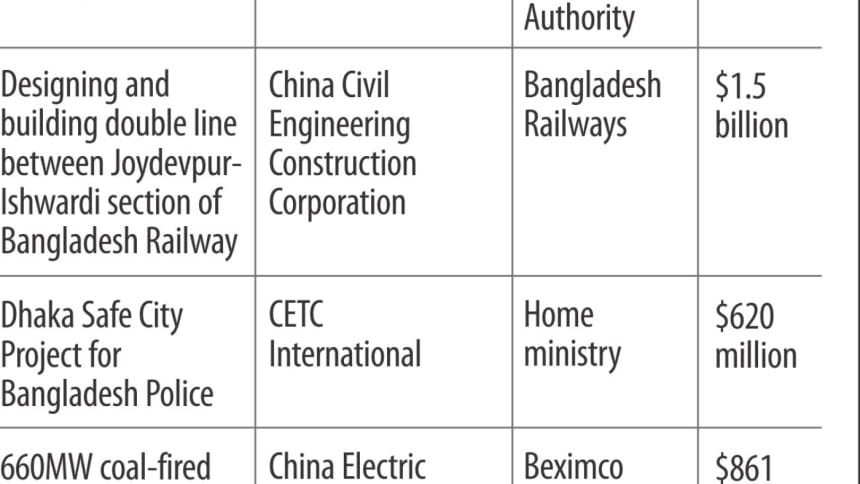Beximco, Meghna tie up with Chinese investors for power
Local business giants Beximco and Meghna signed agreements with Chinese companies to produce a total of 3,500 megawatts of electricity in five years.
The deals were part of the 13 agreements, worth $13.6 billion, that were signed during Chinese President Xi Jinping's two-day visit to Dhaka.
Beximco Group would produce 2,180MW, of which 1,980MW would come from coal-fired plants and 200MW from a solar power plant, according to its Executive Director M Rafiqul Islam.
Beximco and its Chinese partners will invest a total of $3.2 billion to produce the power.
The construction of the solar power plant will begin first: from March next year in Gaibandha. “I hope we can supply the electricity to the national grid from early 2019.”
For the solar power plant, Beximco signed the agreement with TBEA, a Chinese private power producer. Beximco will have an 80 percent stake in the plant and TBEA 20 percent.
Beximco signed an agreement with Chinese state-owned company Power China Resource to build two units of 660MW of coal-fired power plant at Banshkhali and Boalkhali in Chittagong.
“We chose to set up the power plants in Chittagong because of the proximity to the sea -- it would be easy to carry the coal through the sea.”
At the Banshkhali plant, the local company will have a 25 percent stake and the Chinese partner the rest.
For the Boalkhali project, the equity distribution would be 80-20 in favour of Beximco.
Beximco is in talks with companies from Indonesia and Mozambique to purchase coal for the power plants, Islam said, adding that they are aiming to supply electricity to the national grid within the next five years.
About the financing of the three projects, he said Beximco and the Chinese partners are in talks with IPBC Bank and BOC Bank, both from China.
Meanwhile, Meghna Group inked deals with Chinese state-owned Power Construction Corporation to produce 1,320MW of electricity from two coal-fired power plants.
The plants, each with generation capacity of 660MW, would be set up at Daudkandi in Comilla at a cost of $1.75 billion, said Mostafa Kamal, chairman of Meghna Electricity Generation Co Ltd, a unit of Meghna Group.
The Chinese government will arrange the funding and the stake in the power plants will be mutually decided by the two parties. It migth take at least two years for the plants' construction to take off, Kamal said.
“The signing of the agreements is just the beginning,” he said, adding that the proposals will now be sent to Bangladesh Power Development Board and the power ministry for approval.
On October 14 -- the day of the signing of the 13 agreements -- the Federation of Bangladesh Chambers of Commerce and Industry said 11 local private companies signed deals with Chinese companies.
Later, it turned out that among the 11 entities there were only two private companies. The rest of the Bangladeshi entities are state-owned organisations or companies.
For instance, the ministry of youth and sports inked two agreements with China Civil Engineering Construction Corporation to construct an international standard cricket stadium at Purbachal and a football and cricket stadium in Cox's Bazar. The Department of Information and Communication Technology signed a $1 billion agreement with China Railway International Group for connectivity purposes.
Bangladesh Economic Zones Authority signed two agreements worth $5.3 billion with Zhejiang Jindun Holding Company and China Electric Power Construction Group to produce 1,320MW electricity and invest in renewable power projects.
The coal-fired power plant will be set up at Mirsarai in Chittagong. The home ministry signed an agreement worth $620 million with CETC International of China for Dhaka Safe City Project for Bangladesh police.
Bangladesh Rural Power Company signed an agreement worth $433 million with Power Construction Corporation of China and Hubei Hongyuan Power Engineering Co to set up a 350MW coal-fired power plant in Munshiganj.
Bangladesh Water Development Board signed an agreement worth $1.5 billion with China Electric Power Construction Group for sustainable river management.
According to a preliminary list provided by the FBCCI, Orion Group signed an agreement for power generation, but the company's top officials said by phone that they did not sign any deal.


 For all latest news, follow The Daily Star's Google News channel.
For all latest news, follow The Daily Star's Google News channel. 



Comments